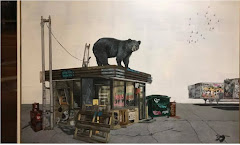Over the coming weeks, minions employed by our Arts Bureaucracies will meet with "industry stakeholders" as part of Telefilm Canada and the Canadian Media Fund's strategy of selling new ways to justify the continued subsidization of Canadian film.
It's already obvious to anyone paying attention that Canadian movies don't do squat at the box office. There may be good reasons for that, legitimate problems within the system that prevent Canadian filmmakers from finding a mass local audience.
But nobody who works for any of the government departments involved in film funding is interested in unearthing those. In fact, what they'd really like to do is bury them further by measuring success in a whole different way instead.
One of the "solutions" offered is how well Canadian films do at film festivals. And in truth, you can't open a Canadian newspaper between the time the NHL playoffs end and the first puck drop of the following season without seeing a puff piece about some Maple Bud being gushed over at some film fest, either foreign or domestic, for their "remarkable" film.
Said film will, no matter how remarkable, likely never find a local distribution deal nor be seen by anyone if it does.
And the sad fact is, not many people probably saw its festival screening in the first place.
I've travelled to a lot of film festivals, been a patron and even on the jury of a couple. And anyone who has done the same can confirm that even if your film plays any festival's largest venue and is re-screened because of audience demand, it will be seen by three or four thousand people at the most.
And most of the titles in most film festivals are seen by a few hundred at best.
That's a fraction of those who see the short films and snippets I post here each Sunday. And I'm a long way from being Youtube or The Huffington Post.
Last year, Andrew Allen, who operates a site I frequently poach from, "Short of the Week" , shot his own short, "The Thomas Beale Cipher", with creative partner Jason Sondhi and then charted how it fared at film festivals compared with the response it garnered online.
His findings are reflected in the illustration below.
In other words, online exposure of his film had a vastly more positive effect on both finding an audience and forwarding the filmmaker's agenda of making a profit and being in a position to do his next film.
To quote Allen, "The biggest thing I learned is that giving something away to earn people’s trust and build a fan base makes selling future creations much much easier—be it a feature film, web series, or even merchandise."
Allen details his experiences here.
Of course, there are a lot of reasons that film bureaucrats would prefer to use film festivals as the measuring stick for Canadian cinematic success. For openers, it allows them to continue to fund the kind of movies they like and audiences do not. There are the perks of travel, sponsorship freebies and after-party goodie bags. With luck there's an open bar for "festival supporters" and the chance to rub shoulders with Claude Chabrol's camera assistant.
But mostly, there's that "bread and circuses" opportunity for local filmmakers to network, attend seminars and see a couple of films no one else will ever see and then feel they are actually a part of an industry -- when they're not.
As any Roman Emporer knew, people who feel part of the pageant are less likely to rise up against it.
Measuring a film's success by asking the hundreds of bloggers like me to do a head count also doesn't make a lot of sense. Our job is simply to introduce you to the work and help build its word of mouth.
No matter how beloved any artistic product is, the one who made it needs more than a thumbs up or pat on the back to survive and move on to making what comes next.
In the beginning, that's where Arts subsidies helped. But, at least in Canada, they seem to have evolved into a system whose administrators need to be supported first; a bureaucracy which strives to justify its own existence rather than making sure our artists achieve (at least) subsistence.
It's no mystery that accomplishing the latter would assure the former. What confuses Canadian artists is why deciphering that is so difficult for some.
It's certainly easier than breaking the code that Thomas Beale created.
Enjoy Your Sunday.






1 comment:
I went in search for a fairly cheap cue rack and liked the idea of these corner ones over a wall mount. The price is right and after it arrived, it assembled in 2 minutes. It's sturdy and does exactly what you'd exect - hold cue sticks. The only complaint is that the top "shelf" is a little too low to comfortably place drinks.
Post a Comment